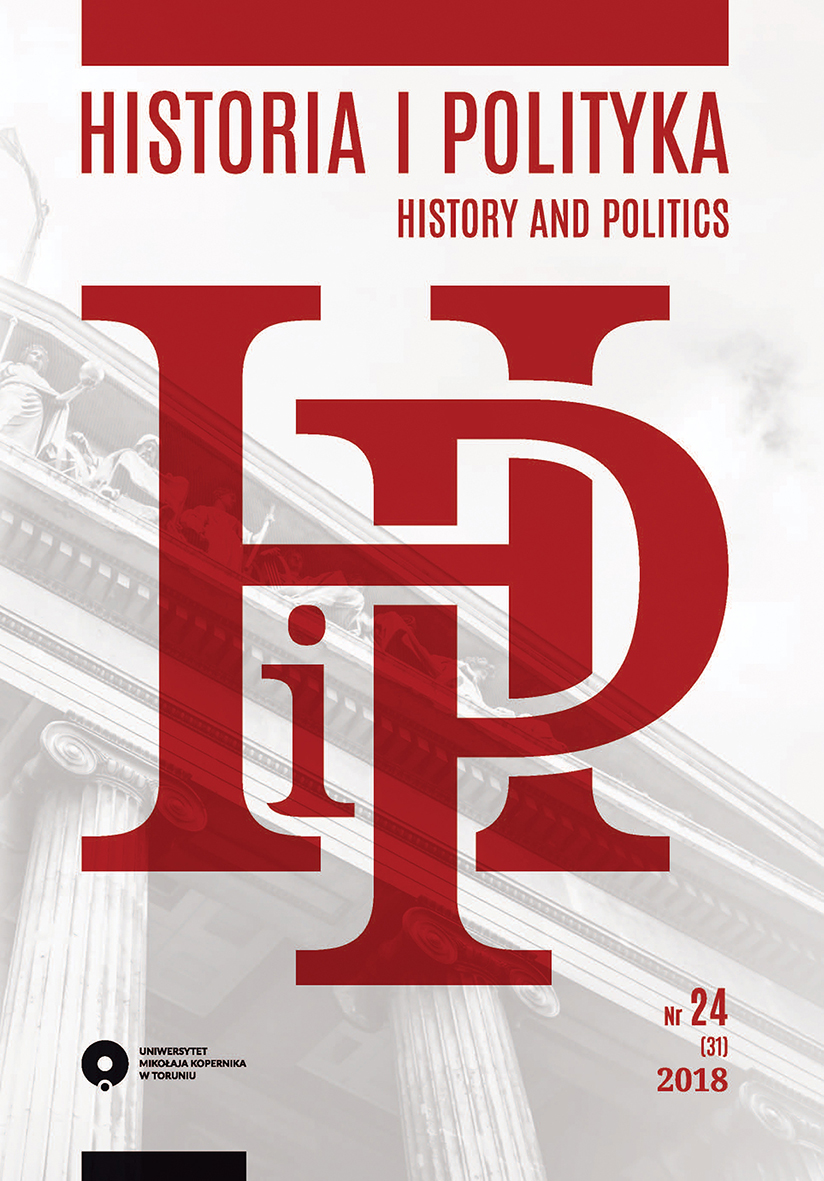Eradication of the National Element in Ukrainian Cinema in the 1960s–1970s
DOI:
https://doi.org/10.12775/HiP.2018.015Keywords
Ukrainian cinematography, creative intellectuals, national motives, national idea, national self-awareness, ideological censorship, persecution, totalitarian regime, Ukrainian ethnic environment, language policy, russificationAbstract
In this article the author studies the elimination of the national element in the Ukrainian cinema of the 1960s and 1970s. The author explores the role and place of national-patriotic issues in Ukrainian cinematography, shows the ideological enslavement of filmmakers, studies the conditions of creative self-realization in the Ukrainian SSR, and analyses the influence of social and political factors on the cultural sphere of Ukrainian people in the outlined period. The representatives of Ukrainian cinema has always tried to popularize national features of their own people, but in the specified period, for censorship reasons, Ukrainian cinema began to be prohibited. The main reason is the struggle with the so-called “Ukrainian bourgeois nationalism”. For such an accusation it was enough to voice any film in Ukrainian and to fill its content with Ukrainian subjects. The characteristic features of Ukrainian cinematography of the 1960s – the early 1970s are as follows: subordination to the Soviet centralized command-administrative system, total control of the CPSU – CPU, russification, denationalization, persecution of all Ukrainian values under the pretext of forming a united Soviet nation.References
Bryukhovetska, L.I. (2006). YuriyIllenko’s Film World. Kyiv: Zadruga.
Chernenko, M.V. (2011). National-Patriotic Aspects of the Cultural and Artistic Heritage of Ukraine (60–80-ies of XX Century). Kiev: The National Pedagogical University named after M.P. Drahomanov.
Demidenko, T. (1993). Party and State Policy in the Field of Culture in the 70’s (On the Example of Ukraine and Byelorussia). Ukraine of the 20th Century: Culture, Ideology, Politics: A Collection of Articles. Kyiv: NASU Institute of History of Ukraine.
Izhakevych, G.P. (1976). Culture of Russian Speech in Ukraine. Kyiv: NaukovaDumka.
Khomenko, N.M. (2006). Students’ Leisure in the Ukrainian SSR During the Summer Holidays (50–60 Years of the XX Century). Ukrainian Historical Collection, 9, 271–281.
Korol, V.Yu. (2001). History of Ukraine: Documents. Materials. Kyiv: Academy.
Krupnik, L.O. (2002). State Policy in the Field of Ukrainian Professional Art (1965–1985): Dissertation of the Candidate of Historical Sciences. Kiev: The National Pedagogical University named after M.P. Drahomanov.
Romanyuk, I.M. (2004). The Ideologization of the Cultural and Educational Sphere of the Village in the 50’s–60’s of the XX Century. Bulletin of the State Academy of Leading Personnel of Culture and Arts, 1, 108–114.
Vovk, V.M. (2008). Life and Leisure of the Urban Population of Ukraine in the 50’s and 80’s of the Twentieth Century. Kiev: Pereyaslav-Khmelnytsky State Pedagogical University named after Gregory Skovoroda.
Knish, I. (1970). Face-to-Face with Ukraine: A Handful of Soviet Impressions. Winnipeg.
Lytvyn, V. (2006). History of Ukraine. Kyiv: Naukovadymka.
Malyuta, I. (2004). Although They Taught Us to Remain Silent... Ukrainskakyltyra, 2 (3), 8–9.
Paradjanov, S. (1994). “I Want to Put a Film About the Murals of Potalich”: Letter to the Central Committee of the Communist Party of Ukraine. Ukraine, 8, 8–9.
Paradzhanov, S. (1994). Rise, Tragedy, Eternity: Works, Letters, Archival Documents, Memoirs. Kyiv: Spalakh LTD.
Shevchenko, T. (1999). “Who is Sergei Parajanov?” Memoirs of Svyatoslav Ivanov. Ukrainian Culture, 3, 2–5.
Slyusarenko, A.G., Gusev, V.I., Drozhzhin, V.P. (2002). Modern History of Ukraine (1900–2000). Kyiv: VyshchaShkola.
The Memorandum of the Central Committee of the CPU “On the Work of Young Literary and Artistic Workers”. (1971). Fund. 1. Description. 25. Case 515. Kyiv: Central State Archive of Public Associations of Ukraine.
Yaremchuk, A. (1994). Sergey Parajanov: “A Blockade is Being Organized Against Me”. Ukrainskakyltyra, 1, 12–16.
Yurchenko, V. (1999). Recollection of Three Wise Men, or Lessons of “White Bird”. Cinema–Theater, 2, 2–5.
Downloads
Published
How to Cite
Issue
Section
License
Nicolaus Copernicus University fully respects the right to privacy and protection of personal data of all authors. The authors’ personal data is not used for commercial and/or marketing purposes.Stats
Number of views and downloads: 622
Number of citations: 0



